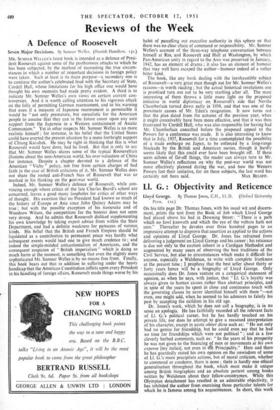Reviews of the Week
A Defence of Roosevelt
Seven Major Decisions. By Sumner Welles. (Hamish Hamilton. i is.) MR. SUMNER WELLES'S latest book is intended as a defence of Presi- dent Roosevelt against some of the posthumous attacks to which he has been subjected, by the method of recounting the true circum- stances in which a number of important decisions in foreign policy were taken. Such at least is its main purposeāa secondary one is to continue the author's celebrated feud with the Secretary of State, Cordell Hull, whose limitations for his high office one would have thought his own memoirs had made pretty evident. A third is to indicate Mr. Sumner Welles's own views on certain current con- troversies. And it is worth calling attention to his vigorous attack on the folly of permitting German rearmament, and to his warning that even if a measure of Japanese rearmament is permissible it would be " not only premature, but unrealistic for the American people to assume that they can in the future count upon any sure support from the Japanese in a Western containment of Asiatic Communism." Yet in other respects Mr. Sumner Welles is no more realistic himself ; for instance, in his belief that the United States could have averted the present situation by a more forthright support of Chiang Kai-shek. He may be right in thinking that this is what Roosevelt would have done, had he lived. But that is only to say that Mr. Sumner Welles shares some of the typical Rooseveltian illusions about the non-American world, his over-valuation of China for instance. Despite a chapter devoted to a defence of the American " Vichy " policy, not free from certain charges of bad faith in the case of British criticisms of it, Mr. Sumner Welles does not share the rooted anti-French bias of Roosevelt that was so marked in his thinking on the post-war world.
Indeed, Mr. Sumner Welles's defence of Roosevelt, while con- vincing enough where critics of the late Charles Beard's school are concerned, leaves a good many loopholes for critics of other ways of thought. His assertion that no President had known so much of the history of Europe or Asia since John Quincy Adams may be true ; but with the possible exception of his namesake and of Woodrow Wilson, the competition for the honour does not seem very strong. And he admits that Roosevelt disliked supplementing his own knowledge by taking expert advice from within the State Department, and had a definite weakness for panaceas of various kinds. His belief that the British and French Empires should be/ liquidated as a contribution to permanent peace was hardly what subsequent events would lead one to give much credence to ; and, indeed the simple-minded anti-colonialism of Americans, and the consequent- suspicion of " British imperialism " which is doing so much harm at the moment, is something that even the slightly more sophisticated Mr. Sumner Welles is by no means free from. Finally, this- book bears out that in addition to suffering under the heavy handicap that the American Constitution inflicts upon every President in his handling of foreign affairs, Roosevelt made things worse by his habit of parcelling out executive authority in this sphere so that there was no clear chain of command or responsibility. Mr. Sumner Welles's account of the three-way telephone conversation between himself at Rio, and Roosevelt and Hull at Washington, by which Pan-American unity in regard to the Axis was preserved in January, 1942, has an element of drama ; it also has an element of humour that may well have escaped the authorāhumour indeed of a rather bitter kind.
The book, like any book dealing with the inexhaustible subject of Rooseveltāa very great man though not for Mr. Sumner Welles's reasonsāis worth reading ; but the actual historical revelations one is prorrfised turn out not to be very startling after all. The most interesting of them throws a little more light on the proposed initiative in world diplomacy one Roosevelt's side that Neville Chamberlain turned down early in 1938, and that was one of the proximate causes of Mr. Eden's resignation. It now turns out that the plan dated from the autumn of the previous year, when it might conceivably have been more effective, and that it was then frustrated by Cordell Hull, who was also responsible for having had Mr. Chamberlain consulted before the proposed appeal to the Powers for a conference was made. It is also interesting to know that in July, 1937, Roosevelt for a time contemplated the possibility of a trade embargo on Japan, to be enforced by a long-range blockade by the British and American navies, though it hardly seems likely that this could ever have been brought off. If these seem echoes of far-off things, the reader can always turn to Mr. Sumner Welles's reflections on why the post-war world was not more effectively planned during the war, and how the Western Powers lost their initiative, for on these subjects, the last word has


































 Previous page
Previous page